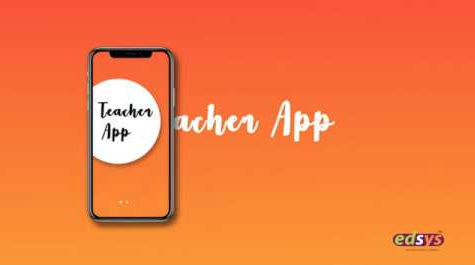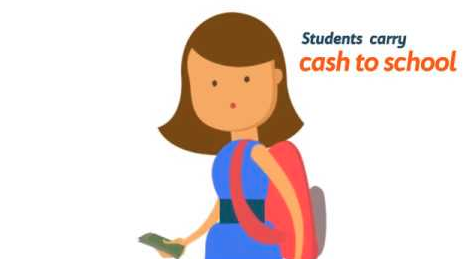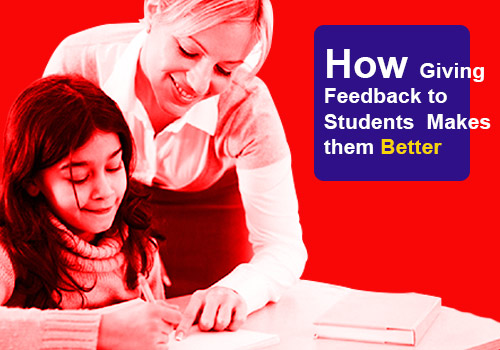Categories(658 Blogs)
Select Category
Watch Right Now
Teacher App - Class
Schedule & Attendance Management App
Parent App from Edsys

Best School Bus Tracking System

Cashless School - For Smart Schools of Tomorrow


How Giving Feedback to Students Makes Them Better

Effective feedback in the classroom is an important tool for learning. Feedback which comes from assessing the performance becomes an indispensable instrument in the toolkit of education. While the main purpose of feedback is to help the students understand the subject in relation to where they stand, it also paves the way to improve their learning. Feedback which comes attached with a clear guidance can become the leading light for students in a number of ways. Here we shed light on the numerous ways in which meaningful feedback bridges the gap between how students are progressing with their learning and what is actually expected of them.
- To Provide Feedback Is To Care
Giving feedback to students is a proven means to improve their learning. Driven by an objective to better student outcomes, feedback when given correctly serves as a guiding light to students. It is through this tool of continuous improvement that students begin to harbor the feelings of care and concern coming from their instructors. They understand that the educators, in their pursuit to better the performance of the class are working very hard. Through feedback, educators can enable students to involve themselves with various educational and co-curricular activities in the classroom.
- The Perfect Timing
There should be a time for everything, more so when it concerns speaking about the performance of students in the class. Thus, feedback should come at the right time for students to make adjustments with regard to their pre-defined goal. When students are given feedback at an appropriate time, they will ponder over the inferences of their faculty and be receptive to their suggestions.
Allowing students to make improvements as they continue to learn, it is through timely feedback that a permanent damage can be avoided. Nipping off the problem in the bud itself, timely feedback provides enormous scope for students to analyze the pointers in the feedback and focus on addressing their deficiencies and flaws.
- Provides Solutions to “Where” and “What” Questions
The prime aim of feedback is to correct major issues concerning either learning or behavior. With feedback, educators will be able to guide students on to the right path by answering the questions” “Where am I going wrong?” and “What can I do to correct myself?” These are the common questions that arise in the minds of students who are assessed for their behavior and abilities.
When the areas of improvement of students are pointed out by the faculty, they will then begin to prioritize what is important. You as a student will benefit from a clear sense of direction which not only sheds light on your inefficiencies but also provides the much needed support to rectify your mistakes.
- A Mixed Bag of Strengths and Weaknesses
Constructive feedback comes as a boon to students willing to better themselves. Teachers should be mindful of the content they present while offering feedback to students. It is hence very important to bring out not only the weaknesses of students but to also recognize their strengths as well. When you as a student are praised about your inherent positives, you will not only take pride in your achievements but will also strive to hone them as well.
On the flipside, when your weaknesses as a student are highlighted, you will start looking at the inferences objectively. You will not get overwhelmed by their feedback since you are already convinced of the fact that your teachers love you for what you are and will begin to accept their suggestions gracefully.
- The Multiple Modes of Feedback
Teachers employ various means to get their point across to students. They can deliver feedback orally, in a written format or through a demonstration. Written feedbacks are helpful to you as you can refer to it at any point of time. Oral feedback comes handy in situations where you as a faculty have lots of pointers to share which cannot be put into a concise write-up.
Interactive feedback is another effective way of engaging in a question-answer session. You will have the liberty to pose questions to your faculty who will provide answers to your queries as part of your improvement plan.
- Sets The Stage for Repeated Practice
You as a student can bank upon feedback as a guiding light towards mastery. Allowing you to focus all your thoughts and efforts in the direction of improvement, you will become a better student with the passage of time. Practice makes a man perfect. In line with this common maxim that is so apt for students, feedback brings in an enthusiasm that will prompt you to practice harder so that you reach the top of your learning curve.
When teachers conduct periodical assessments of your performance, they will come up with recommendations as well compliments that will instil a sense of confidence that you are on the road to recovery. You will do all that is within your means to improve yourself and gain experience by taking well-informed decisions.
- A Boost To Students’ Morale
Learning can be a task for some students. Since every student comes with a different IQ level, not every subject appeals to every student. While you may find science interesting but math difficult, your classmate may be a man of letters. With a class full of students coming from various socio-economic sections, it is important for the faculty to provide effective feedback to students based on these parameters.
Students who are in receipt of regular feedback not only experience a boost to their confidence levels but will also begin to understand themselves better. With a sense of self-awareness, you as a student working around your feedback pointers will tread the path of learning which is fueled by enthusiasm.
- The Target Audience
Teachers may be concerned about a particular student, a group of learners or the entire class. All of them form the various recipients of feedback in a classroom. If you find a particular student struggling with learning, you as a faculty can provide individual feedback. This will help him/her reflect on the shortcomings and make improvements accordingly.
Teachers, most of the times would want to address a group of students or the entire class if they find that they are unable to follow an instruction or a concept that has being discussed in class. In such cases, the educator can employ the means of group feedback which speaks about the deficiencies of a group or the entire class.
- Uncovers The Benefits of Reflective Learning
Feedback is an excellent tool to allow students to look back into what they have been doing that is not delivering the expected outcomes. Permitting them to step back into their past actions, it is through feedback that you as a student will set the stage for an improved learning experience. This practice is referred to as Reflective Learning.
Reflective Learning has a deeper meaning to learning than simply memorizing formulae, dates or scientific facts. It is a method which helps students spare a thought about what they have read, learned or done as part of completing a lesson that was taught in the class. It is through this exercise that helps students to start thinking by asking questions, collecting information and analyzing it so that they can put the inferences into action in their real world.
- The Essentials of Constructive Feedback
Feedback should never be given with an intention to criticize a student. It should always come as an integral part of learning and behavioral improvement. Feedback that is given with this intention in mind will have a strong bearing on the minds of students towards continuous progress. It is for this reason that teachers should come up with effective feedback content. The content should not only provide you with clarity, but also suggest areas of improvement. A teacher providing feedback to students should also keep in mind her tone of communication.
Conclusion
Student achievement can be linked to constant feedback which you as a student will receive from your teachers. For the feedback to benefit you, it is important that you take an objective stand towards every pointer and work on the same. You will then be able to make smart improvements which will transform you into a near-perfect student. Ponder over all the inferences of your teachers so that you will finally tread the path of continuous progress; much to the surprise of your parents and educators as well. You will turn around your life for the better, banking on the observed and delivered feedback coming from your faculty.
Recent Blogs
Our Educational Services
Popular Blogs
Subscribe

SUBSCRIBE TO OUR NEWSLETTER
Sign Up and Recieve the Latest News
Don’t Worry, We Don’t SpamExplore Our Extensive Researched Educational App Directory
Visit Now














